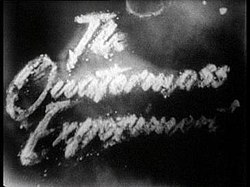The Quatermass Experiment (partially found BBC sci-fi serials; 1953)
Opening titles
Status: Partially lost
Comment: First two episodes survive as low quality telerecordings, the rest is lost
Tags: Historic
The Quatermass Experiment was a series of 6 science fiction serials released on the bbc in 1953. It was created by Nigel Kneale and was enormously influential on British sci-fi, most notably Doctor Who.
Plot
The Quatermass Experiments concerned the adventures of Professor Bernard Quatermass. It starts with him awaiting the return of the first humans to go into space. When the rocket crash lands, they find that two of the rocket crewmembers have gone missing despite sensors indicating the door was not opened. Carroon, the surviving crew-member is gravely ill, and is kidnapped by foreign agents who want information about travelling in space. It turns out that he has absorbed the consciousness of the remaining crew-members and is slowly mutating into a plant like alien organism. After analysing samples of the creature, Quatermass realises that it has to prevented from sporing or else all life on earth will be destroyed. Quatermass the convinces the three human consciousnesses to destroy the creature from the inside.
Lost Episodes
The BBC intended that all 6 episodes be telerecorded onto 35mm film. However the recordings were poor quality (notably with episode 2 having an insect on screen in the recording), and so the idea was scrapped. This makes it unlikely that episodes 3-6 will ever be recovered[1]
Availability
The first two episodes are freely available online and on DVD. In addition, there are copies of the scripts of the missing episodes available on a DVD boxset. [2]
There are also two film adaptations, the first from 1955, [3] the second from 2005 [4].
References
External Links
- The Surviving Episodes Retrieved 21 April '19.
- Wikipedia page Retrieved 21 April '19
